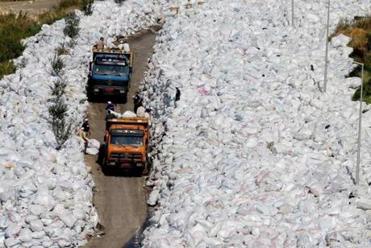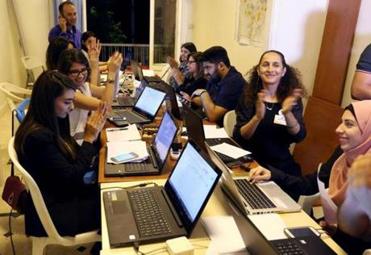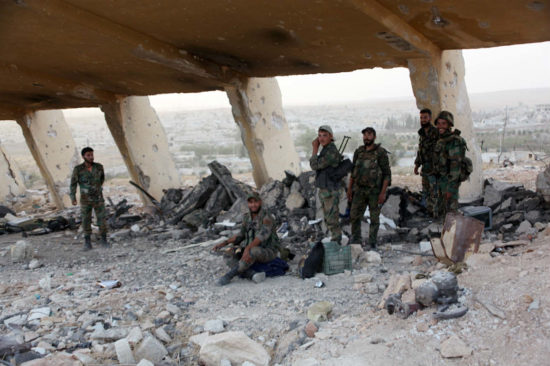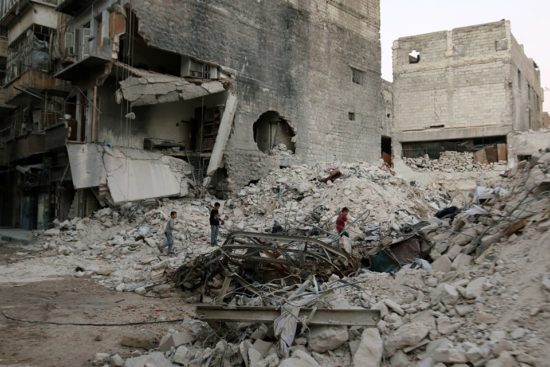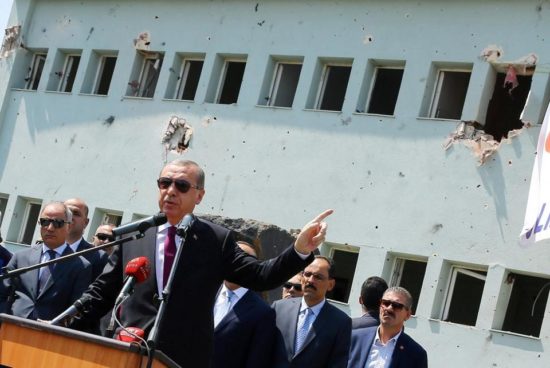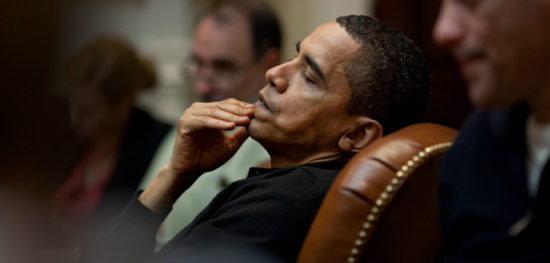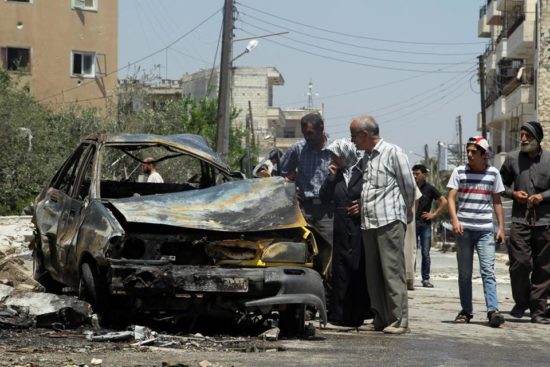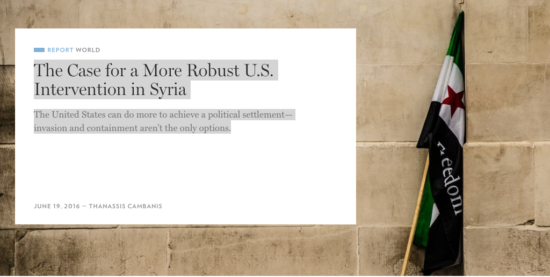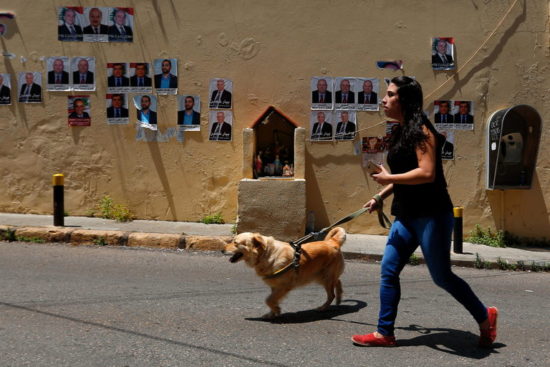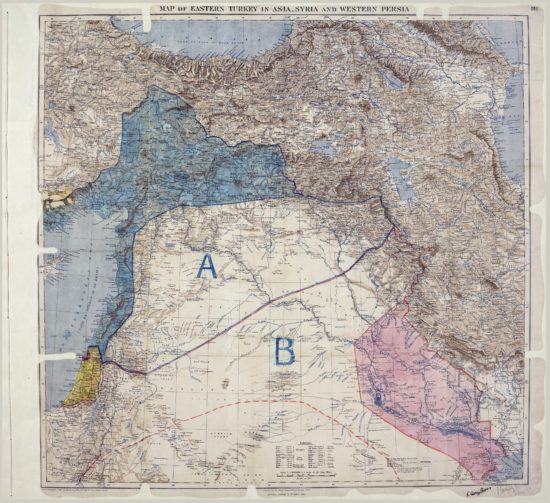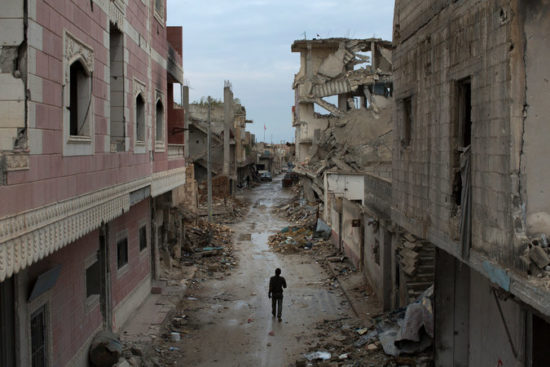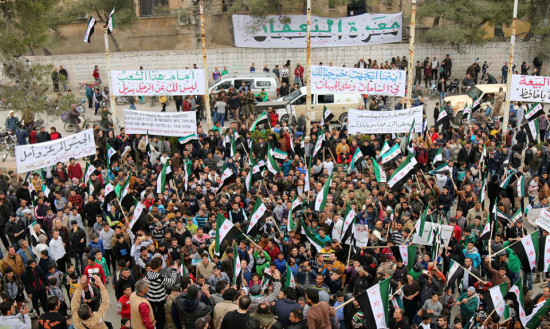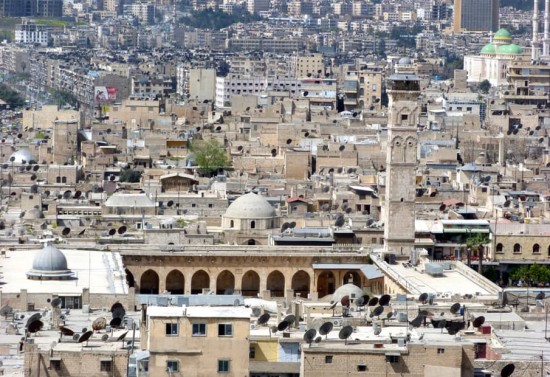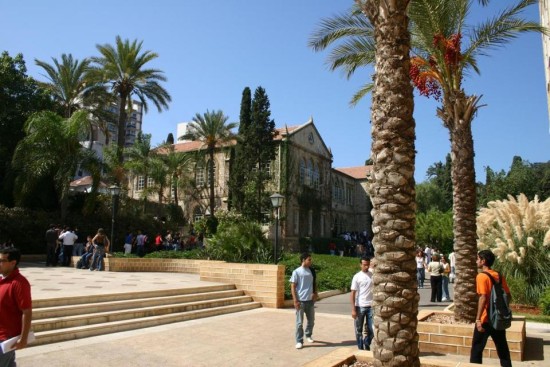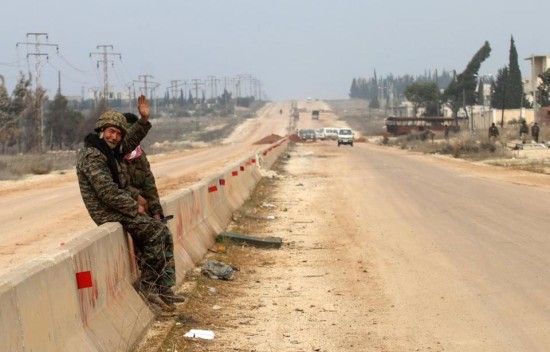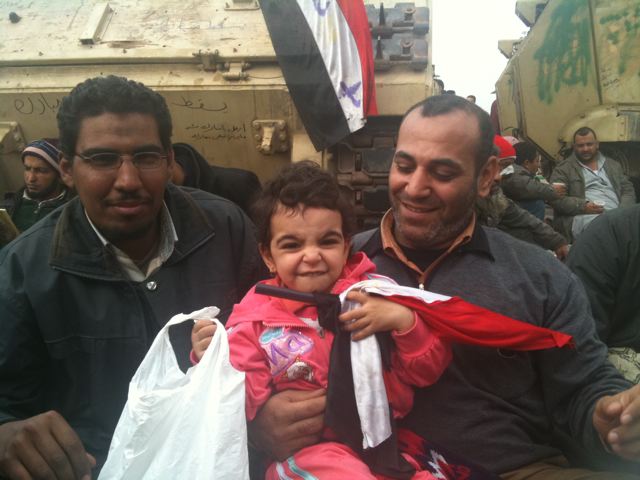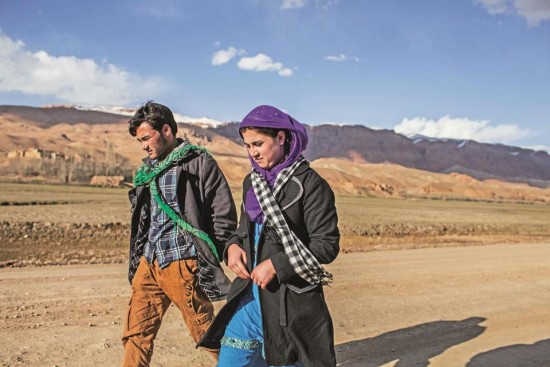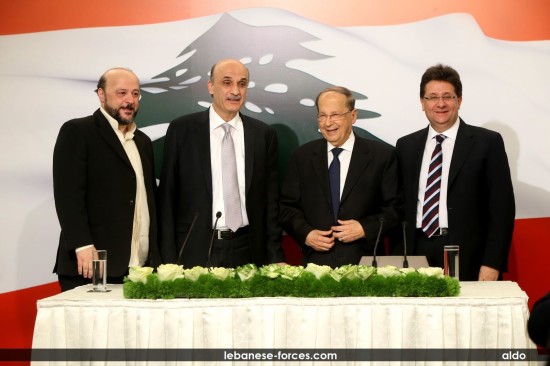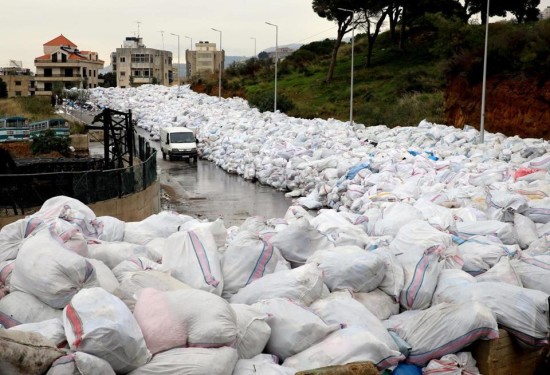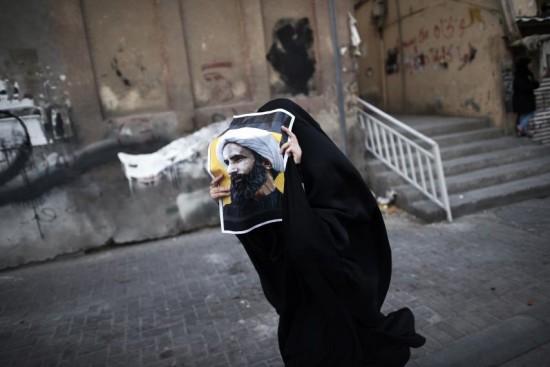Interviewer extraordinaire Terry Gross had Anne and me on Fresh Air, where she asked us about covering Syria and our marriage. You can listen at the link or read the transcript here.
TERRY GROSS, HOST:
This is FRESH AIR. I’m Terry Gross. My guests are reporting on the war in Syria in spite of the fact that they can no longer enter the country. Anne Barnard is the Beirut bureau chief for The New York Times. Thanassis Cambanis is a journalist and Middle East expert who writes a column for The Boston Globe and is a fellow at The Century Foundation.
He’s written two books on the region, one on Hezbollah and a recent one about the Egyptian revolution. Barnard and Cambanis fell in love and got married while they were reporting on the war in Iraq. They ran The Boston Globe’s bureau in Baghdad. They’re now living in Beirut with their two children and managing to write about the war in Syria from a distance with the help of a network of contacts they’ve developed over the years.
They went to a studio in Beirut to record this interview, and as you’ll hear, the studio wasn’t soundproof.
Anne Barnard, Thanassis Cambanis, welcome to FRESH AIR. I’d like to talk with you about how difficult it is to cover the war in Syria. When was the last time you were actually able to get in, each of you?
THANASSIS CAMBANIS: The last time I went to Syria was in October of 2015, right after the Russian intervention got underway.
ANNE BARNARD: And me, I was last there about two years ago. That was the last time I was able to enter because since then, the government hasn’t provided visas, to my knowledge, to any reporter who’s going on an American passport.
GROSS: So you’ve both reported from war zones. What makes Syria different? Why is it too dangerous to go to in addition to the fact that you can’t legitimately get in ’cause they’re not giving you visas?
CAMBANIS: Well, it’s only too dangerous to get into on one end of the conflict. That’s the rebel side. In Northern Syria, people don’t want to report because of the things that we’ve seen, the things that set off the U.S. intervention – the beheading of Western reporters and the tendency of groups like the Nusra Front to take any Westerners they get their hands on hostage.
On the government side, it’s not actually all that dangerous. But it’s the government of Bashar al-Assad that’s incredibly restrictive about when it lets reporters in. And that’s why there’s been such a narrow and sporadic view of the conflict from that side.
BARNARD: Another important factor is the intensity of bombardment in the insurgent-held areas. There’s massive bombardment in rebel-held areas mostly by the government and their Russian allies. And in that case, it’s so intense that it’s difficult for news organizations to send their reporters in. And many Syrian citizen journalists have been killed.
There is bombardment in government-held areas as well from rebel mortars, but it’s not nearly – it’s sort of much more sporadic. And they don’t have airplanes.
GROSS: Anne, you’ve been reporting on the war in Syria for The New York Times. So how do you report on the war if you can’t actually go there and see for yourself?
BARNARD: Well, we’ve worked really hard over the last five years to develop an extensive network of contacts. Many of them begin with people that we knew in, so to speak, physical real life and then spread out from there through friends of friends and sources of sources. And eventually, we have a pretty good network that gives us access to information from many different parts of Syria and from many parts of the political spectrum.
It’s also helpful that both myself and the other people on The New York Times team that are covering Syria have spent time in the country before the war and also in the years when we were still able to go there. So we used to have teams going into the North covering a situation in the rebel-held areas.
And I used to go quite regularly on the government side with a visa. So we were able to meet more people and continue being in touch with them as well.
GROSS: So do you stay in touch through, like, cell phone or social media?
BARNARD: Yes, so first of all, this is a war where activists and civilians and other random people have really made a mark by putting information online. It started mostly as something that opponents of the government were doing to try to document their efforts and initially peaceful protests and the often violent response of the government against them.
And by now, there’s a huge amount of information out there produced still largely by that side but increasingly also by pro-government people, loyalist militias, fans of those militias. And you can find a lot of information online that’s being produced in Arabic that – and also citizen journalism materials like videos and audio recordings.
CAMBANIS: Terry, one thing that people forget when they think about Syria as a black box that we can’t get into is that no matter how dangerous it is, Syrians come in and out of Syria. They cross the lines inside Syria, and they cross the international borders and go back and forth. So there’s numbers – dozens, hundreds of people who come out from both sides of the conflict.
And they come to Beirut, they come to Turkey, they meet with friends and family. They meet with journalists. And then they stay in touch when they get inside. And even the worst-hit towns, the most besieged, heavily-bombed places where people are starving to death tend to have internet a couple of hours a day. People can send voice messages by WhatsApp.
They can chat on Facebook. Sometimes they can call on the phone, regular cell phone or satellite phone. And these are often people that reporters outside get to know in person and then maintain contact with over many, many years. And Anne in her reporting has had the opportunity to really learn who’s trustworthy by seeing what they tell her during one battle or one crisis or one event or another and seeing how that checks out over the years.
And so by the time we’re trying to piece together what’s happening today, we have an array of people we can hear from whose credibility has been established over a long period of time.
GROSS: Because there are so many refugees, like, tens of thousands of refugees fleeing, and so many of them coming to Europe and many of them who want to come to the United States, help us understand why it’s become so impossible to live in Syria and why so many people have left at great risk to their lives. Thousands of people have drowned. So tell us what you know about why life in Syria is so dangerous now.
BARNARD: Well, there’s many reasons. I think many people would tell you the number one reason is air strikes and heavy bombardment on their areas. That has been driving people from Aleppo, from Idlib, from all kinds of areas that have been out of government control for years and years.
And I think you – then once the Islamic State arose and they started treating people in their area very badly, most of their atrocities are actually committed against local Sunni populations and against minorities. So Syrians are also fleeing them. And in areas held by other insurgent groups, in addition to the attacks from the government, you’ll also have an increasing amount of warlordism that is driving people to leave because they feel that their world has become full of criminality and violence.
You also have areas where that’s less the case, but overall, life has become really difficult. And in the government-held areas, you have an increasing economic pressure, you have attacks by the Islamic State. You’ll have occasional mortar attacks. But mostly, you’ll have the fear of inscription into the military.
Increasingly, people can just be picked up – men even as old as 50 in some areas are being picked up at checkpoints and are going into the army. So there’s all kinds of reasons to leave. But that said, even though there is 5 million refugees who’ve crossed international borders to leave Syria, there’s even more people who are displaced from – have been driven from their homes inside Syria.
So altogether, half the population of the country is displaced. And more would leave Syria if they could. But most of the borders are now effectively closed.
GROSS: Anne, you’ve been reporting about how hospitals are being bombed and appears to be intentional. So is that Syrian forces doing the bombing, like, Assad’s forces?
BARNARD: Well, there have been cases of hospitals hit on the government side as well. But by far, the majority and the ones that international organizations have said appear to be being hit systematically are those in rebel-held areas that are being hit either by Syrian government warplanes or by the warplanes of their powerful ally Russia.
And those governments insist that they are not hitting hospitals systematically. But when you look at the numbers, it’s hard not to suspect that. And there seems to be attacks on all kinds of civilian infrastructure – schools, hospitals, roads, all kinds of areas – and marketplaces is a big one.
So in other words, there does seem to be a strategy that aims to prevent normal life and life-saving services from taking place in areas outside government control.
GROSS: Do you feel that you’re both witnessing the rules of war being rewritten, or maybe I should say unwritten, that there are no more laws of war in places like Syria, that there’s just a total disregard for hospitals and schools, for children, for humanity?
CAMBANIS: I mean, I think the Syria conflict marks complete rupture in the direction that we’ve seen for decades now, more and more disregard for the Geneva Conventions. And the U.S. has been a party to that as well with moves like Guantanamo Bay. But in Syria, there’s really an innovation, a really distressing innovation.
And it is the direct and primary targeting of civilian infrastructure, especially hospitals but also civil defense – the people who come in and the volunteers who pull people out of the rubble of freshly bombed structures. The Syrian government has made a point since the beginning of the war of making this the first target of their assaults.
And when we talk to people who are fleeing these areas, including, by the way, most of the doctors who lived in places like Aleppo, which is the biggest city in Syria – used to be the biggest city in Syria and today has maybe a few hundred doctors left out of more than 5,000 at the beginning of the war.
What they say is when the war began, Assad’s security forces came in and started doing things like murdering medical students who were delivering bandages and medical supplies to civilians in rebel areas. Now the message of that politically was to punish people who were supporting rebels.
CAMBANIS: But in practice, it’s also a war strategy that makes it very hard to live in any of these rebel towns. If your school is subject to bombing and if you don’t even have a clinic you can go to get basic antibiotic for your sick kid, you’re much more likely to get up and leave and cross the border or go to an internally displaced camp. And that, according to a lot of Syrians in rebel-held areas, seems to be the point of this government strategy. And it really has changed people’s understanding of what is permissible.
One implication of this is that when we in the West are really horrified by what we see ISIS doing, the atrocities that ISIS commits against civilians. And often, when I’m talking to Syrians, they’ll agree. But they’ll say – I hope you understand that from our perspective, what the government of Bashar al-Assad has been doing since the beginning of the war is no less atrocious and criminal and murderous. And from their perspective, there’s no party that’s powerful that respects these very basic norms of human conduct and conduct of war.
GROSS: I think we should take a short break here. My guests are foreign correspondent Anne Barnard and Thanassis Cambanis. She’s The New York Times’ Beirut bureau chief. He’s a Middle East expert who’s a columnist for The Boston Globe and a fellow at The Century Foundation. They’ve both been covering the war in Syria from there now-home base in Beirut. They’re also married. They got married while they were covering the war in Iraq. We’re going to take a short break here, then we’ll be right back. This is FRESH AIR.
(SOUNDBITE OF MUSIC)
GROSS: This is FRESH AIR. And if you’re just joining us, I have two guests who are joining us from Beirut. Foreign correspondents Anne Barnard and Thanassis Cambanis. Anne is The New York Times’ Beirut bureau chief and former Baghdad bureau chief for The Boston Globe. And Thanassis reported from Iraq for The Globe and now writes a column for The Globe called “The Internationalist.” He is also a fellow for The Century Foundation and author of the recent book “Once Upon A Revolution,” which is about the Egyptian revolution and what happened after.
Thanassis, in a recent article, you described Syria as having become a mosaic of tiny fiefs. The government has ceded control of stretches of land to Iran, Russia and Hezbollah. Lots of territory is controlled by feuding warlords. So it sounds like it hardly even exists anymore as a country, per se.
CAMBANIS: Yeah, it’s terrifying to look at the future and ask – is it possible for Syria to function someday in the future as a normal state, just as a place, the way it did for a century or more? And this is, in fact, the sense of hopelessness that has led a lot of middle-class Syrians to abandon even relatively safe places like Damascus and the Syrian coast because they feel very, very little optimism that tomorrow will get any better.
Now, in practice, what this looks like is, on the government side, when you drive from the border – the Lebanese border to Damascus and then to the coast, you – instead of feeling like you’re in one country controlled by a police state, my impression was that I was crossing through a patchwork quilt of tiny, little authoritarian fiefdoms – some controlled by Hezbollah, some controlled by different intelligence forces of the regime, some of them by Alawite warlords who have been empowered by the regime. And they’ve been given local autonomy in exchange for fighting for the regime.
And what that means in practice is the gangland, mafia-style criminality that’s always characterized Assad Syria has really spiraled out of control. I mean, you know, some of the small things I saw in a coastal resort on the beach area between Latakia and Tartous, a place where a lot of inner-circle regime people have their summer houses – one of the regime cronies had built an enormous, illegal cement gazebo on the beach. And some of the local warlords had gotten so upset and complained to Bashar al-Assad, that he had someone come and blow it up.
And so now, this pristine beach that is, again, frequented even today by members of the regime elite, is littered with the shattered concrete, not of a war bombing, but of an internal power struggle between two different Alawite bosses. There have been shootouts in city centers between rival Alawite intelligence and military chiefs. And there’s a sense of unraveling, even in the regime areas. And that – the further you get from the power center, the more the sense that something is spiraling out of control and might never be able to be put together again.
GROSS: The Obama administration has taken the stand that a military solution is unlikely to work in Syria. But on the other hand, if you look at negotiated settlement, you have so many different warring parties here. I mean, you’ve got the Syrian government. You’ve got all of the different local warlords. You’ve got ISIS. You’ve got Russia. You’ve got the U.S. Saudi Arabia’s involved. Iran’s involved. I mean, it just seems incredibly complicated. Who would even be at the table for a final negotiated settlement? Thanassis, can I ask you what your hopes are that that would actually be a possibility?
CAMBANIS: The grim reality is that wars like this are incredibly messy and murderous. And eventually, they do end. When they end, history tells us, it comes as a result of a combination of military and political work. Everything I understand about the conflict in Syria tells me that it will only end when there is enough of the stalemate that none of the sides believe they can win outright and when they’re drained and exhausted enough and, sadly, when enough people have died that it’s in the combatants’ interest to throw in the towel and accept an imperfect solution rather than keep on fighting to the bitter end.
Now, this is where what America does makes a big difference in the horizon of possibility. If things continue the way they are today, the trajectory of the Syrian war is very clear. It’s going to – essentially, it’s going to fight itself out. It might take five more years. It might take 15. And what we’ll get at the end is something like Iraq today or like Lebanon today – sort of effective partition, a theoretical central government that exists but doesn’t really control most of its territory and mafia-like bosses who control – or sectarian bosses who control the area that they’re based in.
So that’s one solution. And sadly, I think it’s the most likely one. The other solution is one where one of the side manages to either – win the war or achieve a parity and negotiate a settlement in the context of a terrible war. And that’s the dynamic we’re in the middle of right now. Russia has accelerated its intervention. The U.S., despite Obama’s protestations that he’s not going to get involved in Syria, the U.S. is already very deeply involved in Syria militarily as well as politically. So – and it has accelerated that intervention considerably over the last year.
And that is why the last round of negotiations was actually somewhat serious for the first time since the beginning of the war. The two sides – I mean, if you can boil it down to two sides – but – that’s a little simplistic. But the two sides only talk seriously when they feel like they can’t win. And that’s what happened this fall. America and its allies backed a major offensive last spring.
CAMBANIS: The rebels took over Idlib province and made advances around Aleppo. It terrified the government. The government turned to Russia and asked for more help. The government then went on a major offensive supported by Russia and Iran, won back some of the territory it had lost. And lo and behold, in December, for the first time in five years, a negotiation got underway that ultimately failed. But it was actually real talks. And I’m not – don’t get me wrong. I’m not highly optimistic that these kinds of talks will work. But they’ve gone from having zero chance of success to 30 percent chance of success.
And when you’re trying to stop a civil war that’s displaced 13 million people, killed half a million to 1 million and has imploded one of the most important states in the Arab world, causing untold strategic problems for the entire world, including the United States, then raising your chances of a negotiated settlement from zero to 30 is something meaningful, if not something that can give us a whole lot of hope.
GROSS: My guests are Anne Barnard, The New York Times’ Beirut bureau chief, and journalist Thanassis Cambanis, the author of a recent book about the Egyptian revolution called “Once Upon A Revolution.” After we take a short break, we’ll be right back. This is FRESH AIR.
(SOUNDBITE OF MUSIC)
GROSS: This is FRESH AIR. I’m Terry Gross back with two journalists who are covering the war in Syria from a distance because they’re unable to get into the country. Anne Barnard is The New York Times’ Beirut bureau chief. Thanassis Cambanis is a Middle East expert who writes a column for The Boston Globe and is a fellow at The Century Foundation. He’s also the author of a recent book about the Egyptian revolution.
They fell in love and got married while covering the war in Iraq. They ran The Boston Globe’s bureau in Baghdad. They’re now living with their two children in Beirut. They went to a studio in Beirut to record our interview.
Back when you were both based in Iraq, you used to go to Syria for a kind of, like, respite and for little vacations, right? You’d go to Damascus.
BARNARD: Absolutely. And Damascus, in spite of all of its hardships, remains perhaps my favorite place in the whole region. It’s an amazing, magical city, especially the old city, which, unlike so many places that are quaint and beautiful and thousands of years old, some of their buildings, it’s still lived in. You pass amazing mosques and churches and former bits of Roman temples. And at the same time, you’ll see a window stocked with toothpaste or a man selling little tiny whittled dollhouse benches for kids or pots and pans or you name it. It’s just an amazing place.
CAMBANIS: Terry, one of our last getaway vacations before we had kids was a couple of days where we met up in Damascus. I came from Lebanon, which, at the time, was in the middle of its war with Israel in 2006. Anne flew in from Baghdad via Amman.
And we had this great long weekend where we went to Palmyra. And we tooled around the old city of Damascus and spent late nights in these restaurants and these old stone palaces. And we sort of thought that this would be – always be a place, a little oasis, in a region where places like Lebanon and Iraq seemed like they were locked in perpetual war. And we imagined that Damascus – this, you know, eternal city would always be a place we could go to take a break from everything.
BARNARD: I mean, that said, it was already true and still true that, at the time, it was an authoritarian system. Dissent was suppressed. But it was a place where people could walk safely at night and where definitely foreigners did not feel threatened. And, in general, it had at least the surface veneer of calm. I don’t think that means that all was well. But in some ways, its isolation had protected it from becoming a tourist theater.
GROSS: So you’re both covering the war in Syria from your base in Beirut. What do you think Damascus is like now?
BARNARD: Well, our colleagues have been there quite recently. And on the surface, a lot of it looks the same. But it – people are increasingly stressed and tired from the pressures of war. And at the same time, you’ll still see people going and partying and going shopping. It’s not a deserted city by any means. But certainly, it’s much harder to live in.
CAMBANIS: When I was in Damascus in the fall, I was pretty shocked. I hadn’t been since the beginning of the war. And a few things struck me. One was that it really felt like a city without men. The only men I saw were the ones at checkpoints in uniform.
The other thing that really surprised me was how many people were leaving, even from the comfortable upper middle class – in the great teaching hospitals of Damascus, in the well-paid workplaces like the telecoms companies or the U.N. agencies. Something like half of the people in their 20s were getting themselves passports and getting to Turkey and smuggling themselves into Europe.
And when I asked – they told me they see no future for themselves in Syria. And, you know, they said they could always come back (laughter) if things don’t work out. But it just seems like a bad bet to try and build a future, get married, have kids in Syria. And that was a real shock because, you know, Damascus is this huge, vibrant city. And it really felt like a place that is slowly bleeding to death.
GROSS: You both met when you were working for The Boston Globe. And then you fell in love when you were each stationed in Baghdad during the Iraq War. You were covering the war. So when you became a couple, did you feel like you needed to tell your editor right away? That’s – you know, in an office, if you’re having a relationship with someone, it’s always awkward. Like, do you tell your office mates? Do you tell your boss? Will you – one of you be fired if that’s going on? So when you’re in a combat zone and you’re covering war, like, what did you feel you should tell your editor? And what did you feel – and when did you feel the time was right to do it, if you don’t mind my asking?
BARNARD: Well, now is where we play the role of the married couple who either interrupts each other’s story or tells two totally different versions or something. But who should go first, Thanassis?
CAMBANIS: Well, I mean – it’s an easy account if you tell the truth, which is that I asked you to do the dirty work.
BARNARD: That’s true. We were actually – we had been together just very – for a short while while covering Baghdad. But we were still based in Boston, and we came back. And as we were getting more serious, we thought – well, maybe we should find a way to be foreign correspondents and go overseas together. But The Boston Globe had a very small foreign desk – doesn’t have any foreign desk anymore, given what’s going on in the media world. But at the time, it had a very small foreign desk and there weren’t likely to be two posts. But that said, we decided we would propose opening a permanent Baghdad bureau together as co-bureau chiefs.
And I was the one who had to go into the office of Marty Baron. Previously, this wouldn’t have meant anything to the listening public. But people now may know Marty Baron’s famously dour, deadpan manner from the movie “Spotlight.” He’s the editor of The Boston Globe who oversaw the famous investigation into pedophilia in the Catholic Church. And he was played very realistically by Liev Schreiber. So I had to go in and say to this very button-down guy who never reveals anything about his personal life in the office that, by the way, Thanassis and I were now a couple. And we would be interested in going to Baghdad together where they could save money on accommodations since we could live together.
GROSS: (Laughter) An upside for The Globe, yeah.
BARNARD: Marty’s (ph) response was to tell us about all the couples he knew who had shared bureaus together as journalists and had ended up getting divorced.
GROSS: Oh, really? Did that…
BARNARD: Yes, he asked us if we could still do the job if we broke up.
GROSS: Well, that’s an interesting question. How did you answer that?
BARNARD: We said, OK.
CAMBANIS: How can you know (laughter)?
BARNARD: We’ll do our best.
CAMBANIS: We said we thought we could. And I actually found this method worked really well for me. So having asked Anne to fall on her sword and tell all our bosses that we were dating, about a year later, I think, when the U.S. invaded Falluja, I said that she was also welcome to go cover the frontline of that invasion for, you know, representing our family and that I would take the next one.
And as it happened, there wasn’t a next one. So she got to do the hardest-core combat reporting of the two of us.
GROSS: And how did you feel going into the battle in Falluja? And you wrote about this a little bit. You were in an armored vehicle imbedded with the U.S. military heading into the Battle of Falluja, which was, like, one of the worst battles for the U.S. in the war in Iraq. And I think at the time, you had just gotten engaged. You and Thanassis had just gotten engaged.
Your mother was ordering the wedding dress you’d picked out, and you were going into battle.
BARNARD: Yeah, well, this is one of those things when I became a journalist, I didn’t necessarily picture that I would take such risks. And gradually, you find out that you can do things even when you’re scared. And you can do them well. And maybe it’s logical and healthy to recognize the danger around you and to function anyway. You feel – you become dedicated to the story.
And you feel that it’s worth it. And you’re bearing witness. And especially in such a case where the United States was so deeply implicated and where its policies were so questionable and needed a lot of scrutiny, we felt it was our job to cover it. At the same time, once you’re locked in in a vehicle and you have no control, it’s quite terrifying.
And I did picture, you know, what if this is the end of me? Or what if I, you know, end up severely injured? Or – I don’t know. I just, at the same time, you know, in a way, it’s nothing compared to what the people in the places that we cover who are part of the societies at war are going through. So we as journalists are – as foreign journalists – are able to leave.
So it’s never as intense as it could be. And I just – I felt that, you know, when I look back on it, I say, well, of course it was worth it. And I’ve also had many friends die in combat or in other conflict situations. And you never end up saying, well, that was worth their life. So it’s a bit of a paradox.
GROSS: My guests are Anne Barnard, The New York Times Beirut bureau chief, and journalist Thanassis Cambanis, who’s the author of a recent book about the Egyptian revolution. They’re speaking to us from Beirut where they live with their two children. We’ll be right back after a break. This is FRESH AIR.
(SOUNDBITE OF MUSIC)
GROSS: This is FRESH AIR. My guests are Anne Barnard, The New York Times Beirut bureau chief and journalist Thanassis Cambanis who writes a column for The Boston Globe and is the author of a recent book about the Egyptian revolution. They fell in love and got married while they were covering the war in Iraq. They ran the Boston Globe’s bureau in Baghdad.
I could see how being a couple reporting in a war zone can increase the drama of the relationship, like the drama of falling in love, but – and how it can diminish some of the stress because you have a partner in the war zone. But it could also add to the stress because you’re always worried about your partner who’s in a war zone.
So can you talk about that a little bit, the ways in which it’s helpful and more stressful to be in a relationship when you’re both covering the same war?
CAMBANIS: I think in general we’ve been lucky. We’ve been lucky to have each other, especially in Iraq where people, certainly the foreigners there did not have normal lives. It was a huge boon to be able to have a home that we shared and a domestic life where we could take a break from the story and cook each other dinner and sit for an hour across the table and have just a regular couple life. I think that kept us sane in an environment that really was stressful.
Now, I mean, I don’t think you can look at it the same way. We don’t live in a war zone. We live in Beirut which is a, you know – for all the tensions that come with life in Beirut, Beirut is not a war zone. Lebanon is not at war. We live near a war, and we cover a war. We write about it.
But I actually think that, you know, one of the things that’s shaped us both individually and as a couple and as a family is spending a lot of our time channeling the stories of people’s loss, whether its loss of their communities or loss of their children or their parents or their loved ones. And it’s 13 years now we’ve been writing a lot about death. And since having children, we’ve written – especially Anne has – about children who die. And that is much harder. I mean, I have interviewed a lot of people – parents of dead children – in my life sadly. And before I had kids, it was a different experience. It was hard and emotional, but it was something I could do as part of my job.
Now every time I do that, I start to cry and often I can’t really position myself as a chronic – you know, objective is the wrong word. But I can’t position myself as a sort of person who’s just taking testimony and bearing witness. I view myself as – I mean, I sense that loss, the loss of a parent whose kid is dead. And it’s almost unbearable. As a writer, as a reporter, you know, that world becomes secondary. My first role becomes as a human being sitting with someone who’s suffering.
And that has really changed my relationship to the people I interview and the stories I tell because ultimately this is – this era in this region is a story of major epochal loss. And it’s catastrophic in scale and huge, but it’s ultimately human – individual human losses each of one of which is too much to bear. And now in the 13th year of this stage of it, it’s in the millions this loss. And it’s – sometimes it’s really staggering and emotionally impossible to process.
BARNARD: This brings us back in a way to your first question about covering a war not always but often at a remove. A lot of my days when I’m in Beirut are spent partly at least talking to people on the phone or on Skype and also watching videos.
And I can’t tell you too many times these videos involve children who are blown into pieces or parents holding the bodies of their dead children or children being pulled out of the rubble sometimes dead sometimes alive. And their little bodies – their arms and legs and, you know, their toys are often the same size as those of my own children.
And these are things I never thought I’d see ever and now I see them routinely. And when I see those pictures, I think about the way my children’s bodies feel in my arms. And when I – the way our life works sometimes as foreign correspondents in another time zone from our editors, you might be working before and after the moment when you go and cuddle your child to sleep. And sometimes I am literally watching something like that, and then I’m going and snuggling up to one of my kids in bed. And then coming back to work.
And it’s not just the surrealness of that, it’s also, you know, how would I explain this to my child as they’re starting to ask about the things that are going on around? You know, how is my child safe in bed here where literally less than two hours drive from here a parent could be worried that an airstrike or a sniper or a car bomb could end their life or their child’s life at any moment?
GROSS: You’re speaking to us from Beirut where you’re living now. And what kind of aftereffects of the war in Syria are you seeing in Beirut? Are there a lot of refugees there? What do you directly feel concerning the war living in Beirut?
CAMBANIS: In the first war, that you feel the aftereffects of here in Beirut, is the Lebanese civil war which ended in 1991, but in some ways never ended. So this is a little country that 25 years after the end of its civil war still doesn’t have 24-hour electricity, still doesn’t have any sort of halfway representative election system, doesn’t have any kind of basic services like, you know, to get your passport or to get your water hook up or to just get the basic, basic decencies of life – health care, education – still don’t exist.
So this place for an average Lebanese, Lebanon is a catastrophe, and there’s no excuse for it 25 years after the war. So that is the first layer of infuriating and humiliating daily reality in Lebanon. Now add onto that since the war in Syria started, something like 1 in 3 human beings inside Lebanon’s borders is a Syrian refugee.
So imagine this wrecked infrastructure that couldn’t even support the people who lived here before, and now you’ve got half a million kids – extra kids needing to go to school, people needing to get food, people needing to flush their sewage.
The country is crowded to a breaking point. Even in our neighborhood, we walk by dozens of street kids from Syria who are begging around the hospitals and universities around our home. And the further you get closer to the border, the more you can – you feel like you’re in a post-apocalyptic world of displaced people who are living suspended lives.
GROSS: I wish we had more time to talk, but our time is up. I thank you both so much for talking with us, and I wish you well. I wish your family well. Thank you for doing this.
CAMBANIS: Thanks, Terry.
BARNARD: Thank you so much.
GROSS: Anne Barnard is The New York Times Beirut bureau chief. Thanassis Cambanis is a fellow at the Century Foundation. They spoke to us from Beirut where they live with their two children.
